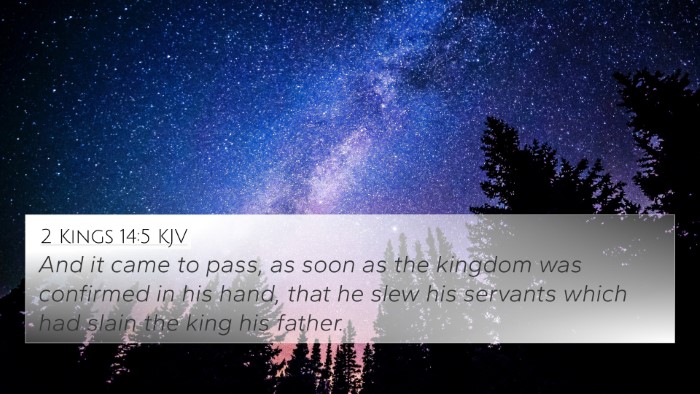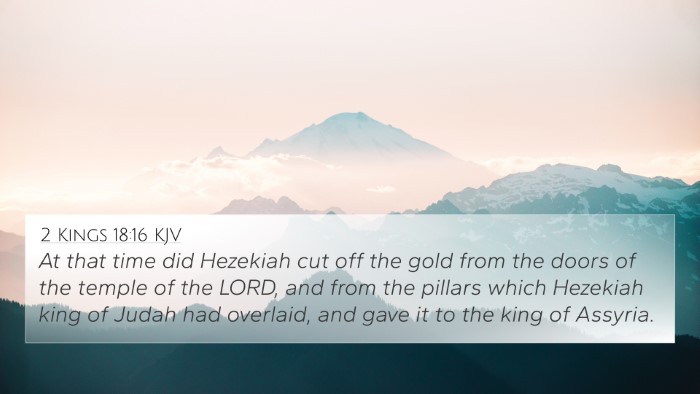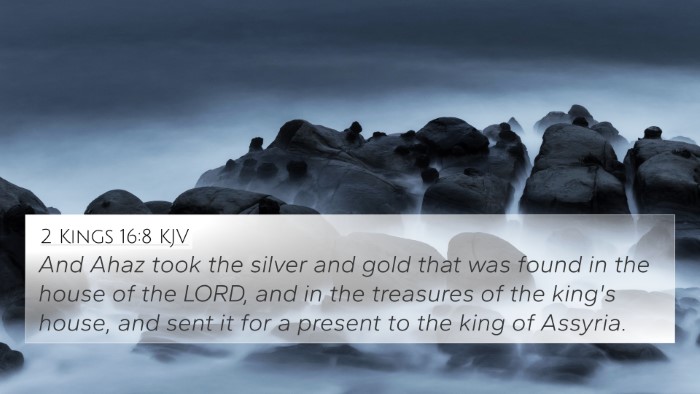Meaning and Interpretation of 2 Kings 15:19
2 Kings 15:19 reads: "And Pul, the king of Assyria, came against the land: and Menahem gave Pul a thousand talents of silver, that his hand might be with him to confirm the kingdom in his hand." This verse is pivotal in understanding the political dynamics of ancient Israel, particularly during the reign of Menahem.
Contextual Background
During this period, the kingdom of Israel faced significant threats from external powers, particularly Assyria. Menahem, who ascended to the throne during a time of turmoil, sought to secure his rule through political maneuvering and alliances.
Commentary Insights
According to Matthew Henry's commentary, this action by Menahem illustrates the reliance on worldly power rather than faith in God. Instead of trusting providence, Menahem resorted to paying tribute to Assyria to solidify his reign, thus showing a lack of faith in divine protection.
Albert Barnes notes that Menahem's choice to engage with Pul, offering a substantial bribe of silver, reflects the desperation of Israel at this time and highlights the political instability that marked the era of the divided kingdom.
Adam Clarke emphasizes that such actions, relying on brute force and material wealth, often lead to deeper entanglements with oppressive rulers, stripping the nation of their autonomy while cultivating a culture of dependence on foreign power.
Theological Implications
This verse serves to underscore a recurring theme in the Old Testament: the dangers of alliances with foreign nations over reliance on God. Menahem’s decision symbolizes a broader trend of distrust in divine sovereignty, leading to corruption and moral compromise.
The payment of a thousand talents of silver not only speaks of Menahem’s priorities but also raises questions concerning the ethical implications of his actions. By compromising his kingdom's integrity, he set a precedent for future leaders in Israel.
Cross-References
- 2 Kings 14:25 - Discusses the context of Menahem's rule and the state of Israel.
- 2 Kings 15:20 - Describes how Menahem's tribute was financed through heavy taxation.
- 1 Chronicles 5:26 - Mentions the Assyrian dominance over Israel and connections to Menahem’s actions.
- Proverbs 21:30 - Highlights the futility of relying on human wisdom against divine counsel.
- Isaiah 8:4 - Serves as a warning against alliances and reliance on foreign powers.
- Jeremiah 17:5 - Pronounces a curse on those who trust in men over the Lord.
- 2 Kings 17:3 - Chronicles the eventual downfall of Israel due to such alliances and lack of faith.
Applying the Lessons
For readers today, 2 Kings 15:19 serves as a cautionary tale about the reliance on worldly means to secure authority or peace. The actions of Menahem represent a significant lesson about the spiritual and moral ramifications of placing trust in human alliances rather than in God.
Connecting Biblical Themes
This verse is enriched through inter-Biblical dialogue that links the themes of power, trust, and divine sovereignty seen throughout the scriptures. Many passages provide parallels that deepen the understanding of Israel's choices and their consequences.
Utilizing tools for Bible cross-referencing, one can easily see these thematic connections, enhancing one's study through a comparative Bible verse analysis. This approach highlights how different scriptures resonate with one another, shedding light on a central truth: God ultimately governs the affairs of nations.
Final Thoughts
In conclusion, the interpretation of 2 Kings 15:19, when studied in conjunction with other scripture, offers profound insights into the balance of faith and governance. It encourages readers to reflect on their own dependencies and the importance of trusting God's plans amidst life’s uncertainties.













